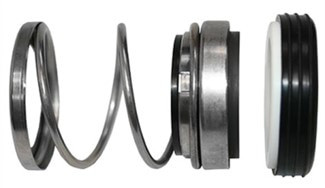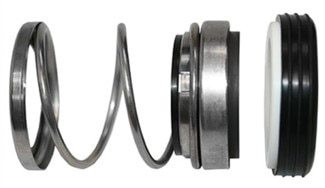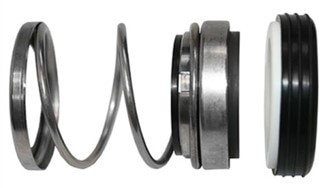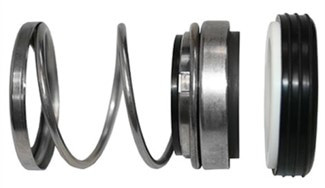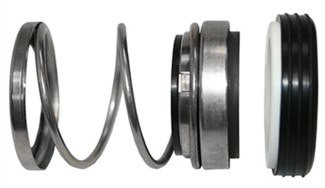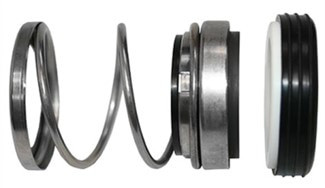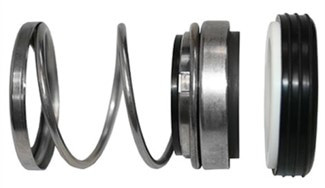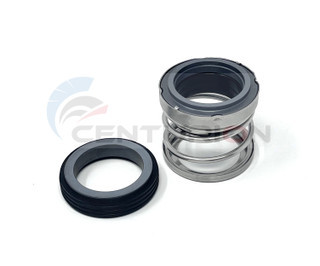
Mechanical Seals for Pumps
Are you tired of dealing with leaks and inefficiencies in your water pumps?

What Are Mechanical Seals for Water Pumps?
Types of mechanical seals for water pumps
There are several types of mechanical seals designed specifically for water pumps, each with its own unique features and advantages. Here are some of the most common types:
Single-Spring
Mechanical Seals
Multiple-Spring
Mechanical Seals
Cartridge
Mechanical Seals
Split
Mechanical Seals
Magnetic
Drive Seals
Metal
Bellows Seals
Single Spring Design
Explore Our Range of Mechanical
Seals for Pumps
How do mechanical seals work in water pumps?
Mechanical seals play a crucial role in water pumps by effectively sealing the rotating shaft of the pump where it enters the pump casing. This prevents water from leaking out of the pump and maintains the pressure within the system. Here's a simplified explanation of how mechanical seals work in water pumps:

The pressure of the water within the pump also helps to maintain the integrity of the seal. The hydraulic pressure pushes the two sealing surfaces together, further enhancing the effectiveness of the seal.
Many mechanical seals incorporate a spring mechanism to ensure that the sealing surfaces remain in contact with each other even as the pump operates and the shaft experiences slight movements. This spring provides the necessary force to keep the seal tight and prevent leakage.
The Benefits of Quality Mechanical Seals for Pumps
01.
Leak Prevention
Say goodbye to frustrating leaks and spills with our premium mechanical seals. They create a tight barrier that keeps fluids where they belong – inside the pump.
02.
Enhanced Efficiency
By minimizing leaks and reducing friction, our mechanical seals help your pumps operate at peak efficiency, saving you time and money.
03.
Longevity
Invest in quality seals today, and you'll reap the rewards for years to come. Our durable materials and expert craftsmanship ensure that your pumps stay in top condition for the long haul.
Current Top Sellers
Comparison of mechanical seals vs traditional
seals for water pumps
When considering mechanical seals versus traditional seals for water pumps, it's essential to understand the differences in design, performance, and application. Let's compare these two types of seals across various factors:
Mechanical Seals | Traditional Seals |
Mechanical seals consist of two main components: a stationary part and a rotating part. They create a dynamic seal around the pump shaft, utilizing faces or surfaces that move relative to each other to prevent leakage.
| Traditional seals, such as gland packing or lip seals, typically rely on static contact between the sealing material and the shaft or housing. They create a static seal that may wear over time due to friction and contact with the rotating shaft.
Traditional seals may be limited in their ability to withstand extreme operating conditions. Gland packing, for example, may degrade over time when exposed to high temperatures or aggressive chemicals. Traditional seals may require more frequent maintenance and replacement due to wear and degradation over time. Gland packing, for instance, may need to be adjusted or replaced regularly to maintain effective sealing. Traditional seals may have lower initial costs but may incur higher ongoing maintenance and replacement expenses over time, particularly in demanding applications. |
Why Choose Us for Your Mechanical Seal Needs

Quality Assurance
We understand the importance of reliability when it comes to mechanical seals. That's why we source only the highest quality materials and adhere to strict quality control standards.

Expert Support
Not sure which seal is right for your pump? Our team of experts is here to help. We'll work with you to understand your needs and recommend the perfect solution for your application.

Fast Shipping
We know that downtime is not an option when it comes to your pump systems. That's why we offer fast and reliable shipping options to get you back up and running as quickly as possible.
Mail: sales@sealit123.com
Phone: 305.454.5679
SealIT123
Buy mechanical seals online
561 NE 79 Street,
Suite 365
Miami, FL 33138
